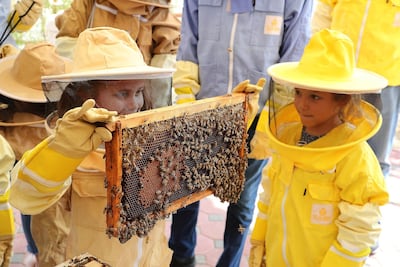A look inside one of the largest bee farms in the UAE has revealed how record numbers of insects play an important role in improving the nation's food security.
It is six months since the MyHive programme at Sustainable City in Dubai topped up the bee population inside the Hatta Honey Bee Discovery Centre with 250 new hives.
Keepers are now fully realising the value of that investment, with peak Sidr tree season yielding impressive honey yields.
In partnership with Apiculture and Nature for the Betterment of Health and Beauty (ANHB), one of the Gulf’s largest beekeeping operations, tens of thousands of bees have already been nurtured to pollinate surrounding flora and fauna, crucial for agriculture.
Two years on since the project launched, experts are extracting bee products in record volumes.
“Globally, one in three bites of food we eat relies on bees and other pollinators to survive, that shows how important they are to all of us,” said Shadi Zakhour, a beekeeper and chief marketing officers at the ANHB.
“Bees produce five things from the hive: honey, propolis, royal jelly, wax and bee venom - it is not just about the honey.
“The bee venom is actually used as an apitherapy medicine and can be used to treat multiple sclerosis, or any kind of muscle damage.
“It can be localised in creams and sting therapy.”
Plants can only reproduce via pollination from bees and other insects.
When bees collect pollen and nectar from inside the flower of a plant, it sticks to the hairs of its body
When it visits the next flower, some of this pollen is rubbed off allowing for fertilisation so fruits and seeds can develop.
Without this process, many plants and crops would die.
The MyHive programmes at Sustainable City is educating the community on the role of bees in agriculture, and encourages more people to ‘adopt’ new hives to increase the bee population.
“It costs a lot to produce quality honey and takes a lot of time, good genetics and equipment,” said Mr Zakhour, who hosts tours for visitors to the Hatta honey production site to explain the process.
“Bees may only live from 45 to 60 days and the queen is the only one to lay eggs in the hive, she is much larger and lives longer.

“It says a lot about royal jelly, as it is what the queen feeds on to make her larger.
“Our beekeepers will not wear gloves most of the time, but during their extraction the bees tend to sting a lot more.
“I would swell up a lot initially, but I have some level of immunity to the stings now. After many years you get used to it.”
There are three main seasons of UAE honey production.
The Sidr season is underway now, and is usually extracted from trees originating from Yemen. Its antibacterial properties are used in medicine across the Middle East.
While the Samar tree is pollinated in early summer in the Gulf, the Ghaf tree honey season is in June and July.
A large hive of 10,000 to 15,000 bees is capable of producing up to 4 kilograms of honey a day.
Beekeepers, or apiculturists, at the Hatta centre are currently studying the medicinal properties of two other types of honey, from the Samar tree and Damas or Syrian honey.
Under the MyHive programme, for an annual fee of Dh3,000 participants receive up to 10kg of honey, educational material on the process and three visits to the apiary to view the pollination and extraction process.
“Bees play a crucial role in increasing crop yields and promoting food security and nutrition,” said Salem Al Qasimi, chairman of ANHB.
“We have created the MyHive programme to grant the opportunity for individuals and corporations to adopt a hive of their own.
“In this way, the UAE population will learn more about the honeybees and their contributions to the ecology that not only deliver high quality honey, but also support a healthier lifestyle.”
Legislation approved by the Ministry of Climate Change and Environment a few years ago now allows Emirati beekeepers to bring in new species of bees into the country.
This has considerably increased the amount of honey produced locally.
Imported bee species produces 10 to 20kgs of honey per hive annually, while the local species produces only one to two kgs of honey per hive annually.
“These legislations also facilitate carrying out experiments that target increasing honey production by local bees,” said Thani Al Zeyoudi, the then Minister of Climate Change and Environment.
“Honey is at the top of food products to be sustained, as it has a cultural value for the Emirati community as well as rich nutritional and economic benefits in general.”















